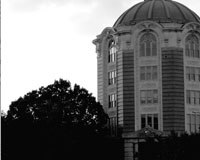
Mass Transit
Half light
The New World
Ovation
With the windows sealed
Green marks seaward. Red on the right, return.
I can see the bus. Mildewed and vacant in this lot.
Brambles choke the wheel wells, I must step past blotched sides
under a roof, pried open. Ankle high a colony of bluebells anoints the floor.
Bluer than a closed eye remembers— each hooded petal blinks in petition to the sun.
The hymn of this machine sings through me.
Hydraulic harmony, the clench and sigh of commuters.
Arms hinged from handrails, shoulders rise and fall in diesel chorus.
The bus lurches us to work, carries us and our goods, return us home in solace.
I wear the separation bus riders cherish—
busy to avert a gaze, stare lock-eyed on a device.
Or bob adrift in unspoken slurry. But all our bodies fog the same
windows and dodge the same rain that beats beyond the swinging door.
Then the hymn is silent. The bus once mighty
in motion, now a carcass slack to the earth. A wilted
field runs its length. The hood of each bluebell rotten down
to a collar. And I close my eyes. I have lost the faces of the congregation.
—After Witnesses by W.S. Merwin
Dusk has brought its moth
and let it drink from the buzz
of the lamp, along the avenue, up
the steep hill. Seated on the shingles
of the roof, you have pine needles
pressed to your thigh. What do you see?
As the watchmaker oils each axle.
We are civilians in time,
pedal fast and the chain leaps
to the next gear. Surely the night can
make way for one more dark passage
without collision. And the earth
through her orbit.
We have this hour before
feet must find the ladder’s rung
that brings us down.
My father worked after the baby was eased to sleep
and the highchair wiped with the sponge.
Relief came to him in precedents and prior rulings
when his pencil loped the lines of the yellow pad.
At night, his aunt’s ghost climbed the common stairs
raised her arm to ring the door’s chime—
blue numbers etching her veins. Her visit was the end
of a thread that ran down the stairs and over the ocean
to the muddy barracks where she weighed 60 pounds.
And back further, to a wooden village by the river that froze
in winter, where she played on ice. She traveled in a plume
of rose water and brine. The remains of the old world.
In the morning, my father awoke to summer’s sheen
and the musk of cut grass. We were new to the new south.
We learned to see the dead and the living in the kudzu
and the culverts. How a creek was called a run.
How hooves and chains plowed name over name
where foothills broke the Piedmont.
He slowly uncurled my small fists from the temples
of his glasses. When I was old enough to ask
he began when you were born. His voice was oil
to parched wood. He never said what he wished for.
Let me make again the leaf
The high-five sweetgum to the sky
Pointy fingers that wag the breeze
Let me rise, cut from burlap
Planted by the Department
A sapling held first by a stick, later by a metal guard
Then held by nothing, nothing above the pavement and the galvanized grate
A century of people, a century of passing cars
Chainsaw my crown
Cleave me in two
For a gasp that sags with electric lines
Let branches bud
Let lobed leaves mop rain and diesel
Breathe idle burn
And grow-on, with thick moss and tufted shoulders
Let me spring open 10,000 green eyes
Canvas cream cups and blue trumpets
Let me shimmer with starlings
Give rest to urban flight
Let me work this corner of the street
Trunk lichen
Endure tags and knifings
Collect strewn sharps and charred foil
Let me grace the ghost bike
Canopy concrete
Shield the soft wounds so they don’t crust in the sun
And when you look up
let me applaud the creases of your face
I turn from Cherry
to Seventh, see a man
who is lanky, in his thirties
with black hair back
in a bun. He pulls
at his jeans without
a belt, the tell-tale stain
of shit down his pants
as he kicks to flick
from his leg the filth
of sticky rivulets. He yells
at nobody, then somebody
who walks by, wearing flats.
What is a mouth
but another orifice
that roils? Whose hand
gathers me as I tremble.
Walks me back inside
four walls. Washes me
tender with a cloth, so I
can know the taste
of sweet milk again.
Green marks seaward. Red on the right, return.
You have welded the seams twice
and chosen a deep mooring.
With a firm anchor, cast the buoy far
where all channels must go, out to open water.
Winter is long—raw gales and dark swells
then skies socked in, and nights of dead reckoning.
There is a saying, the sea has no memory
only indifferent tides, with laps of logic from the moon.
But on bright days, I see
the buoy there, still.
It winks to the trawler as it returns
home to the bay.
And to the mother, who steps slowly
over rocks that line the shore.
Seth Rosenbloom is a poet and consultant to companies on leadership and management. His poems have appeared in ONE ART, Hawai’i Pacific Review, Evening Street Review, CutBank Online, and other publications. Seth was born in Washington DC and lives in Seattle.

